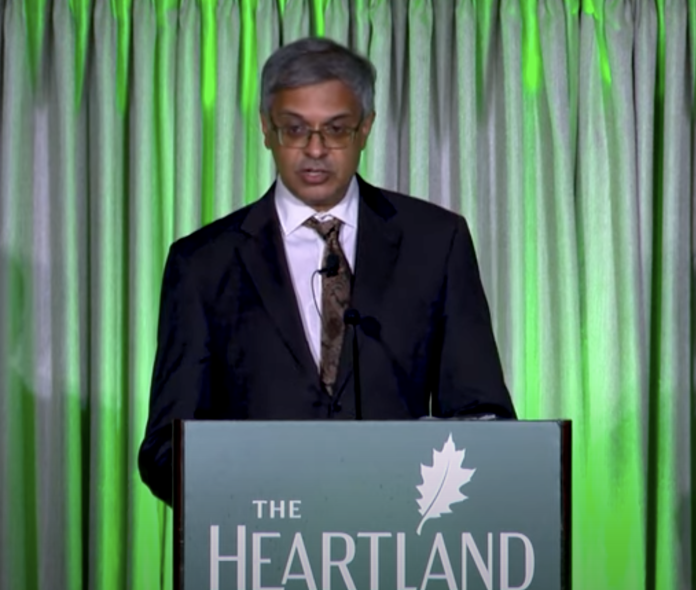Citing Winston Churchill’s “Iron Curtain” metaphor describing the Cold War division of Europe, health care policy expert Dr. Jay Bhattacharya told an audience, “We are now in the middle of a Silicon Curtain of censorship descending across the previously free West.”
In a keynote address at The Heartland Institute’s Benefit Dinner in Chicago on September 13, Bhattacharya said public health is the new “fig leaf” for justifying government censorship.
“Free speech is in dire danger in the U.S.,” said Bhattacharya. “The government will use its power to suppress criticism [of] its own misinformation.”
Bhattacharya is a plaintiff in Murthy v. Missouri, in which the Supreme Court lifted a preliminary injunction directing the Biden administration not to “coerce or significantly encourage social-media companies to suppress protected speech” and remanded the case to a lower court.
“This gives a way to the government to censor at will,” said Bhattacharya. “All they have to do is send emails and algorithms to social media companies without naming a single person—just name ideas not allowed to be said online.
“The First Amendment, in effect, is an unenforceable dead letter,” said Bhattacharya.
Under Fire for Opinions
Bhattacharya, a medical doctor and professor of medicine, economics, and health care research policy at Stanford University, rose to prominence when he published The Great Barrington Declaration (GBD) on October 4, 2020, with epidemiologists Martin Kulldorff and Sunetra Gupta. The declaration criticized COVID-19 lockdowns and urged authorities to focus on keeping children in school and protecting the elderly instead of imposing broad-based restrictions.
Although the writers were highly recognized for their work and associated with Stanford, Harvard, and Oxford Universities, respectively, powerful government figures denounced them. Francis Collins, then-director of the National Institutes of Health, and Anthony Fauci, then-director of the National Institute of Allergy and Infectious Diseases, called the trio “fringe epidemiologists” in emails that were made public later.
Ostracized and Blacklisted
Bhattacharya was ostracized by other professors at Stanford and was blacklisted on Twitter. When Elon Musk purchased the social media giant, he discovered the list and shared it with Bhattacharya.
Google “de-boosted” the GBD, which was posted online and signed by more than 940,000 doctors, researchers, and concerned citizens. Facebook banned the posting of it altogether.
Using internal government emails they obtained, the plaintiffs showed the government was controlling social media companies by threatening to regulate them out of business if they didn’t abide by the Biden administration’s censorship demands.
The White House also used universities to help with the censorship work, which the government is prohibited from doing directly. Bhattacharya brought up the case of the Stanford Internet Observatory, which received government grants to develop algorithms to target a particular idea. The government shared that information with social media platforms.
Rising Worldwide
Europe, Canada, the U.K., and Australia have led the way on legislation to control speech, Bhattacharya told the audience. The bills and laws ostensibly outlaw violence, pornography, and hate on the internet, carry Orwellian names, and establish authorities to do the enforcement.
These include the Digital Services Act in the E.U., the Online Harms Act in Canada, and the Online Safety Act of 2023 in the U.K. A bill in France establishes a digital “safety” commission for the same purpose.
“It is dangerous to let governments have control over the definition of hate,” said Bhattacharya. “It’s even more dangerous to allow government to determine what is misinformation because science and medicine depend on free speech to operate properly.”
Censoring Political Opponents
Bhattacharya brought up the case of Scott Jensen, a medical doctor, and Minnesota state senator who ran against Tims Walz for governor in 2022. Jensen was a prominent critic of COVID-19 policies, and Facebook censored his election page.
Jensen lost the race, and Walz went on to implement some of the most draconian COVID-19 restrictions and is Vice President Kamala Harris’s running mate in this year’s presidential election. Jensen says his respect for Bhattacharya is immense.
“Dr. Bhattacharya’s willingness to present and stand by a contrarian narrative—which ultimately proved to be profoundly wise—will go down in history as an act of immense courage in the face of smothering government censorship fueled by behemoth, profit-driven technological companies,” said Jensen.
“Americans’ First Amendment rights are under attack by a political elite, but Dr. Jay Bhattacharya continues to stand in the breach and do whatever is necessary to protect and defend free speech,” said Jensen.
AnneMarie Schieber (amschieber@heartland.org) is the managing editor of Health Care News.





















